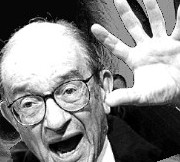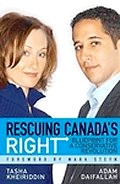Teach kids Alan Greenspan, Harry Potter or, who?
Review of Age of Turbulence
PART 2: SO WHY AREN'T WE ALL CONSERVATIVES?
(Part 2 of 3)
By Larochelle & L'Hirondelle -- Nov. 2007

The American libertarian republican economist Alan Greenspan is an unabashed "fiscally conservative" defender of free markets and British author J.K. (Joanne) Rowling has made brilliant use of free market (and free trade) to go from being a "poor-single-mom" to being a billionaire. So why would anyone in their right mind have one negative word to say about either Greenspan or Rowling?
In the American movie Jesus Camp, Pastor Becky Fischer said: "And while I'm on the subject, let me say something about Harry Potter. Warlocks are enemies of God! And had it been in the old testament, Harry Potter would have been put to death. You don't make heroes out of warlocks."
Furthermore, in his article "Flawed blueprint for Canada's Right," Rory Leishman states: "There is much shrewd policy advice in Rescuing Canada's Right: Blueprint for a Conservative Revolution, by Tasha Kheiriddin and Adam Daifallah. However, the overall plan of the work is fundamentally flawed: If Stephen Harper and his conservative advisers were to adopt the libertarian policy platform advocated in this book, they would consign the Conservative Party of Canada to political oblivion" ("The Interim," January, 2006)

Leishman, who is a freelance journalist, goes on to state: "Kheiriddin and Daifallah are libertarians masquerading as conservatives... President Ronald Reagan put together an enduring coalition of libertarians and conservatives in the United States. Harper and his conservative advisors must do the same in Canada."
Leishman seems to contradict himself until you consider the fact that he's a Catholic and, in Reagan's "Speech to the National Association of Evangelicals" he said, "The Declaration of Independence mentions the Supreme Being no less than four times. 'In God We Trust' is engraved on our coinage" (Orlando, Florida, March 8, 1983).
On this revealing theme, we can also find a lecture on the "Institute for Canadian Values" website by former Prime Minister of Great Britain Margaret Thatcher where she states:
"For over two centuries, Americans have held fast to their belief in freedom for all men - a belief that springs from their spiritual heritage. John Adams, second president of the United States, wrote in 1789, 'Our Constitution was designed only for a moral and religious people. It is wholly inadequate for the government of any other.' That was an astonishing thing to say, but it was true."
("God and Man: Perspectives on Christianity in the 20th Century," Hillsdale College, 1994).
Clearly, this is more "sermon" than "political science" lecture. Identically, on the "Acton Institute for the Study of Religion and Liberty" website American conservative author William F. Buckley Jr. states: "Christianity asks each person on his own to earn salvation -- praying, to be sure, for grace and relying on God for help -- by the same token capitalism leaves the consumer pretty much in charge, not only of what he selects to do with his economic surplus, but with the freedom to accumulate that surplus" "Morality and American Society," May and June 1992).
Back in Canada, Carolyn Ryan's CBC article "Stephen Harper and the road to power," states that "Harper was a voracious reader, and the books he tackled in the next year would change the course of his life. Thinkers such as Adam Smith, Friedrich Hayek and William Buckley left him with a profound respect for the workings of a free-market economy and a set of neo-conservative beliefs that were being put into political practice by Britain's Margaret Thatcher and America's Ronald Reagan"
Harper himself on the Christian Coalition International (Canada) website has an article "Rediscovering The Right Agenda," where he states:
"The Reagan-Thatcher revolution was so successful that it permanently undermined the traditional social-democratic/left-liberal consensus in a number of democratic countries. It worked domestically to undermine the left-liberal or social-democratic consensus, causing those parties to simply stop fighting and adopt much of the winning conservative agenda. Socialists and liberals began to stand for balanced budgeting, the superiority of markets, welfare reversal, free trade and some privatization" (Citizens Centre Report Magazine, June 2003). http://www.ccicinc.org/politicalaffairs/060103.html
Nobel Laureate economist F. A. Hayek in his book "The Constitution of Liberty" included the essay "Why I Am Not a Conservative," where he wrote, "Let me now state what seems to me the decisive objection to any conservatism which deserves to be called such. It is that by its very nature it cannot offer an alternative to the direction in which we are moving." ("The University of Chicago Press," 1960).
More directly, in Ayn Rand's 1964 Playboy magazine interview she said, "The ideological position of [William F. Buckley Jr.'s] National Review amounts, in effect, to the following: In order to accept freedom and capitalism, one has to believe in God or in some form of religion, some form of supernatural mysticism. Which means that there are no rational grounds on which one can defend capitalism."
In other words, despite the fact that Greenspan was once a close ally of Ayn Rand (she attended the ceremony when he was sworn in as chairman of the Council of Economic Advisers in 1974), he abandoned her anti-religious principles to form electoral alliances with religious conservatives such as Thatcher and Reagan.
In his article "Libertarian Divorce?" Donald Devine (American Conservative Union Foundation) wrote: "So libertarians are demanding a divorce from the conservative movement because conservatives do not support freedom? As the man said, It depends on the definition of freedom... Not only did Hayek set the family as one of the two essential preconditions for freedom, he said: 'Paradoxical as it may appear, it is probably true that a successful free society will always in a large measure be a tradition-bound society'"
Even with the status of being a Nobel Laureate social scientist, F. A. Hayek could not bring himself to publicly admit that the "freedom" demanded by religious conservatives is both incompatible with scientific laws and with a universal constitutional laws that protect the rights of all citizens.
For example, the Acton Institute for the Study of Religion and Liberty is "a 501 (c)(3) non-profit, non-denominational organization" that "relies solely on the fully tax-deductible contributions" to pay the $140,350 salary of its President Robert A. Sirico who is a Roman Catholic priest.
The U.S. Internal Revenue Service states that organizations described in section 501(c)(3) are commonly referred to as 'charitable organizations'.
This means average citizens are exempting the Acton Institute, a free market think tank, from risking bankruptcy by having to sell a product for a profit in the "free market".
As former NASA astronaut Frank Borman put it: "Capitalism without bankruptcy is like Christianity without hell." If economics really was a science, the Acton Institute would go broke.
Finally, the Scottish moral philosopher Adam Smith wrote: "Science is the great antidote to the poison of enthusiasm and superstition." (From "Of the Expense of the Institutions for the Instruction of People of all Ages" in "The Wealth of Nations," 1776.)
Hayek and Greenspan (secular conservatives) capitulated to religious conservatives: they could not publicly challenge the idea of theocratic dictatorship. Secular conservatives turn a blind eye to the twisted market/moral fundamentalism where religious conservatives condemn J.K. Rowling to hell even though she is one of the most successful capitalists who ever lived. This is the root of the controversy over Greenspan's book.
Back to Intro ------------------------------------------ Next: Part II